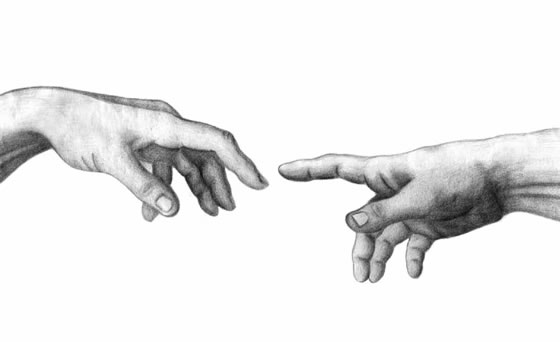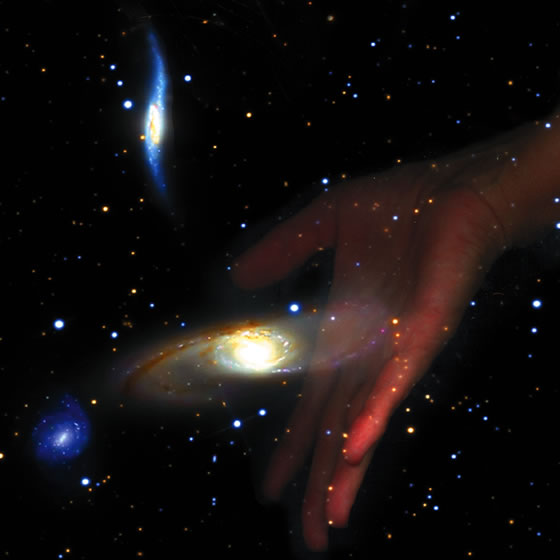
Written by Bruce Sanguin (For German translation see below)
Theologian John Haught suggests that the best name for God, and one that is grounded in the scriptural narrative, is The Future (1).The idea of God inhabiting the future is harder to grasp than God inhabiting the past or the present. We have history books, our own personal history, and memory to assure us of the reality of the past. It’s stuff that happened already. The present is not a problem for us either. It seems undeniable, if only by our apparent incapacity to dwell fully in it, as Eckhart Tolle and other gurus of the “now” remind us. The present is this moment and we’re able to experience it by breathing deeply, stopping our chattering mind, and inhabiting our experience. It’s stuff that is happening now.
But this moment is also always about to intersect with a future that’s always in the process of arriving. There, it just arrived again. But we have difficulty granting full, existential status to the future, because the future, by definition, doesn’t exist yet. Unlike the past and present it has no content. Yet, it just arrived again. And in the moment of its arrival, it’s no longer the future. The future is always just beyond our grasp, yet always in the process of arriving.
In the Biblical book of Revelation, God is referred to as Alpha, the beginning, and Omega, the end. We’ve tended to privilege God as Alpha— Creator. But we haven’t done much thinking about how God is present as Omega—the end. Fundamentalist religion does think about God as Omega, but to these folks it means that God has fixed a predetermined end time when “He” will bring history to an abrupt and violent end. This way of thinking renders the past and the present as little more than filler. It’s just what happens while we’re hanging around for the real action—apocalyptic action—to take place. It diminishes the role of history and our personal role in shaping the future.
Death Makes Life Possible – Trailer from Institute of Noetic Sciences on Vimeo.
“Death Makes Life Possible” explores the taboo topic of death and asks the fundamental question: How can understanding death give meaning to our lives? Marilyn Schlitz, is a cultural anthropologist and scientist who sets out to find answers to the ultimate meaning of life, death, and what lies beyond. Featuring Deepak Chopra, Mingtong Gu, Julie Beischel, Edgar Mitchell, Dean Radin, Marilyn Schlitz and some of the world’s greatest researchers of consciousness, out-of-body experiences and life-after-death – “Death Makes Life Possible” takes us on a journey of exploration beyond the physical body. Facing the fear of death can transform the experience of living. “Death Makes Life Possible” is a must see for anyone who is going to die.
For more info about the project see Institute of Noetic Science
 Researchers say the anger, resentment and blame people hold on to, often for years, accounts for a lot of today’s health problems, and learning how to forgive could prove to be curative and preventative.
Researchers say the anger, resentment and blame people hold on to, often for years, accounts for a lot of today’s health problems, and learning how to forgive could prove to be curative and preventative.
“Forgiving and releasing old hurts from your system is like taking a mental and emotional bath,” said HeartMath founder Doc Childre. “Notice how people bathe their bodies on a regular basis, yet they will store negative, toxic junk in their mental and emotional natures for years without a cleanup.”
Negative emotions such as anger, resentment and blame can cause stress to build up in the body, and where there is excessive stress, there is the potential for all sorts of physical, mental and emotional problems. Most notably, elevated stress levels can impair the body’s immune system, putting you at risk for heart disease, chronic pain, and depression among many other debilitating conditions.

Ein Interview mit Thomas Hübl von Alexandra Scheper und Sylvia Grunwald
„Die Kunst der wachen Beziehung“ lautet das Thema des diesjährigen Celebrate Life Festivals, das vom 26. Juli bis 4. August 2013 in der Nähe von Bremen stattfindet. Im Vorfeld der Veranstaltung, die sich in vier Modulen mit frühkindlichen, erwachsenen, globalen Beziehungen und schließlich mit der Beziehung zu Gott beschäftigt, haben Alexandra Scheper und Sylvia Grunwald Thomas Hübl zu Beziehungdynamiken bei Paaren befragt.
Wenn wir lieben, fühlen wir uns einerseits glücklich und verbunden, andererseits auch schnell verloren oder verletzt. Woher kommt diese Unsicherheit?
Wenn wir beginnen, uns zu öffnen, werden grundlegende Programmierungen in uns angesprochen. Gerade in intimen Beziehungen zeigen sich deshalb ganz frühe Beziehungsmuster. In einer erwachsenen Form von Beziehung stehen das Nehmen und Geben in einer gesunden Balance. Wenn aber erwachsene Menschen frühkindliche Muster leben, können sie weniger geben als nehmen und die Balance von Freiheit und Bezogenheit ist gestört. Dann haben wir entweder das Gefühl, unseren Partner konstant zu verlieren, und trauen uns nicht, uns weiterzuentwickeln. Oder wir haben die ganze Zeit Angst, unsere Freiheit zu verlieren, und lassen uns deswegen nicht ganz ein.
Als Kinder haben wir in unserer Familie gelernt, wie wir Aufmerksamkeit bekommen. Die einen durch Brav-Sein, die anderen durch Beleidigt- oder Ärgerlich-Sein. Da gibt es viele Möglichkeiten. Wenn mir das nicht bewusst ist, möchte ich diese Portion Aufmerksamkeits-Energie auch von meinem Partner haben. Wenn dieses Verhaltensmuster aber nach der Phase des Verliebt-Seins nicht mehr mit dem meines Partners korreliert, gibt es Spannungen. Ich denke zwar: Das ist Liebe. Aber im Prinzip ist es nur ein Weg, wie ich Energie in Form von Zuwendung bekomme.
Wie kann ich denn mein altes Rollenverhalten ändern?
Zuerst gilt es, Bewusstheit für das eigenen Verhalten zu schaffen. Manchen Menschen fällt gar nicht auf, dass Anspannung und Unzufriedenheit da sind. Der zweite Schritt ist, sich genau zu beobachten in den Situationen, in denen das Verhalten auftritt. Was mache ich, was fühle ich? Der dritte Schritt ist, dass ich mir bei Beziehungsproblemen jemandem mit großer Klarheit hole, der mir ein guter Spiegel sein kann. Und das ist oft nicht der Partner. Wenn frühkindliche Anteile auftauchen, ist es gesund, zu sagen: „Okay, hier können wir uns nicht mehr klar sehen. Wir gestehen uns das ein. Jetzt übernehmen wir dafür die Verantwortung. Ich schaue mir meinen Teil und du schaust dir deinen Teil mit jemandem an. So erhalten wir die Mann-Frau-Beziehung. Und diese Projektionen, die aus frühkindlichen Anteilen entstehen, löse ich mit einem Therapeuten auf.“ Wenn du eine starke erwachsene Perspektive hast, können natürlich auch Partner, Freunde und die Menschen, mit du dich sonst auf einer tiefen Ebene austauschst, helfen. Dann ist eine therapeutische Unterstützung nur für schwierigere Fälle notwendig.

by Autumn Antal
Soft driven, slow and mad like some new language. Reaching your head with the cold, sudden fury of a divine messenger.
— Jim Morrison
Knowing what we call reality is a holographic expression of infinite consciousness playing — and knowing you are That consciousness — here are some words about words,
just for fun:
English language demands duality to exist.
English is a language built on a foundation of opposition. This can result in unique mental dysfunction for native English speakers. [I know whereof I speak.] First among them is our profound fixation on judgement. Everything is black and white in a mind that thinks constantly in polarized English words. As a culture, we are close to losing the capacity for subtlety.
In reality, opposites are complementary. This nondual vision is known to the East and to some extent in Western culture. Yet, its simplicity is often its cause for dismissal by minds desiring complication. Not to fault the mind; the mind’s job is to measure and to divide input into little bits it “thinks” it understands. However, it does further to put the tool down when not in use. Human thought is not the speed limit of consciousness we think.



 Help us to grow! What's about to write interesting articles and share the knowledge and new concepts and help to make a sustainable shift in this world. We are living in a transformative world and we need more activists to help to change the world view. Don't hesitate
Help us to grow! What's about to write interesting articles and share the knowledge and new concepts and help to make a sustainable shift in this world. We are living in a transformative world and we need more activists to help to change the world view. Don't hesitate 